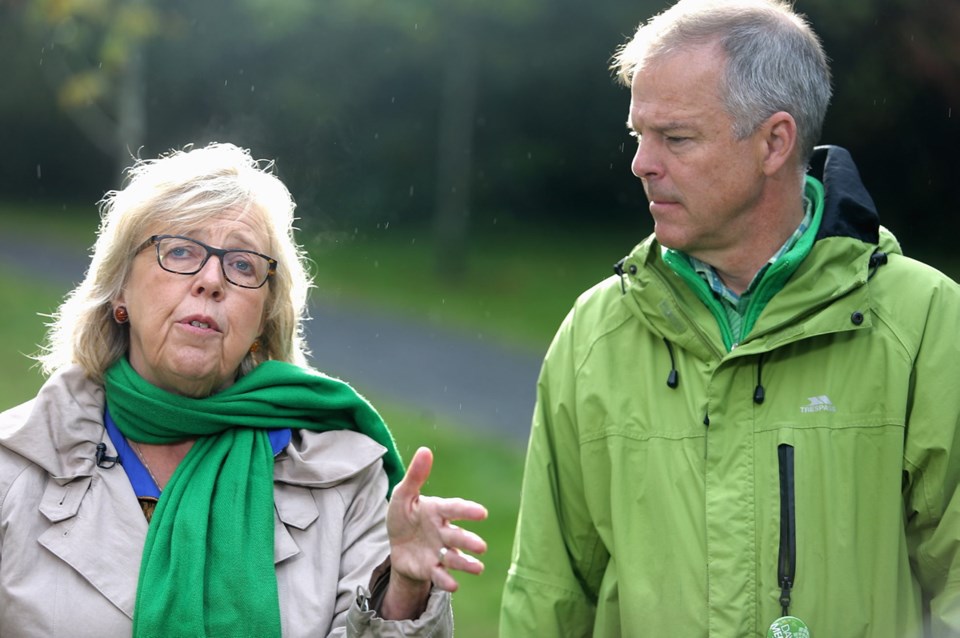David Merner spent part of Thursday on the phone to a woman in the Maritimes, urging her to run for the leadership of the federal Green Party.
That might seem odd, considering the Victoria man is himself going for the job, but he doesn’t see it that way.
“From a party perspective, it’s much better if you have a competitive field,” he says.
Alas, the race to replace Elizabeth May isn’t exactly choked with star candidates. Ditto for the race to take over from Andrew Scheer as leader of the Conservatives. Nor, so far, has anyone leaped into the void to replace Andrew Weaver at the helm of the B.C. Greens.
Which raises the question: Why are so few high-profile people interested in leading political parties?
Or, put another way: Who wants to play goal for the darts team?
And there, in part, is the answer. Politics has always been an elbows-up game, but these days, the nasty stuff is more public, unrelenting and grinding.
“It can be a pretty brutal experience, particularly in the world of social media,” Merner said Friday. “It takes a lot out of you. It kind of wears you down.
“You have to really tell yourself, ‘I’m going to stay positive.’ ”
If a politically experienced, perpetually upbeat fellow like Merner feels that way, imagine what it’s like for others.
Merner arguably has the most solid credentials of anyone running for the Greens so far: bilingual, retired at 57 from life as a University of Toronto-educated government lawyer, owns a pair of master’s degrees, including one from Oxford.
He’s also a former president of the B.C. wing of the federal Liberals, and ran as that party’s candidate in Esquimalt-Juan de Fuca in the 2015 election. He ran in the same riding last year, this time for the Greens, after switching teams in 2018 on the day Justin Trudeau announced the feds were buying the Trans Mountain pipeline.
Merner isn’t a household name, though, not like Jody Wilson-Raybould, another erstwhile Liberal who was wooed by the Greens but turned them down. Nor is he one of the Greens’ three members of Parliament: Nanaimo’s Paul Manly and New Brunswick rookie Jenica Atwin, both of whom have declined to run, and May, who pulled the plug as leader in November.
Jo-Ann Roberts, who �鶹��ýӳ��Island listeners will remember as the host of CBC Radio’s All Points West, is filling May’s old role until October’s leadership convention.
She says a dozen people have shown interest in running, and she figures eight to 10 might actually enter after the leadership-race rules are released Feb. 3.
Don’t expect a high entry bar like the $300,000 demanded by the Conservatives (Merner thinks the Green fee will be more like $25,000 to $30,000), but don’t expect every candidate to complete the race, either.
Roberts says the Greens want the contest to be accessible initially, but then want candidates to prove they can build support, show vision, collaborate — to lead, in other words.
Some might be weeded out by the need to not only handle sniping from outside the party, but to deal with internal strife, too. “I think for a lot of people, that’s too much politics,” Roberts says, though she argues that’s a bigger issue in parties with larger caucuses, where MPs who aren’t appointed to cabinet or critic posts, and who are forced to vote the party line, feel powerless and become restive.
Ordinary party members grumble, too. They probably always did, but these days their voices are amplified. Last fall, it was surprising to hear local Conservative campaign workers openly complaining about Scheer, a relative unknown who they thought spent too much time smiling for the cameras and moaning about Trudeau and too little telling voters about himself and the party platform.
That kind of residue awaits whoever takes over from Scheer — not that there’s a long queue of contenders, not without an obvious path to unhorsing Trudeau anytime soon.
Rona Ambrose, who might eventually become the prime minister’s nightmare opponent, declared herself a non-starter this week. So did Pierre Poilievre, whom many expected to run.
Conventional wisdom says that leaves Peter MacKay as a shoo-in, though Merner isn’t so sure. As an old-style red Tory, MacKay would be anathema to the party’s social conservatives.
Anyone seeking leadership of any party has to balance factors: their own readiness, the party’s chance of success, finances, the age of their children … “The stars have to align,” is how Roberts puts it.
Some people are disingenuous when citing family reasons for ducking a political opportunity, but many aren’t, Merner says. Some can’t afford the financial consequences of changing course to run for office.
That Maritimer whom Merner tried to persuade to run? She said no. She’s her family’s main breadwinner. “I just can’t put my family at risk,” she said.
And all parties must worry about losing potential candidates, really good people, who take themselves out of the running simply because they can’t stomach the prospect of all the negativity leadership entails, all the time, from inside the tent and out.



